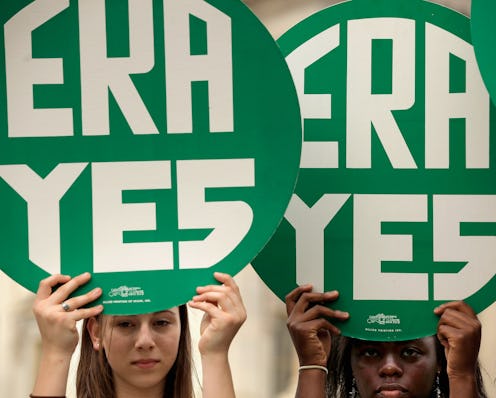
As allegations of sexual assault against a myriad of high-profile men continue to emerge, there is now a renewed push to ratify the Equal Rights Amendment (ERA). Advocates note that the pervasiveness of sexual assault, illustrated by the #MeToo campaign, highlights exactly why the ERA needs to be made law.
The ERA is a proposed constitutional amendment that would guarantee American women equal rights under the law. It was passed by Congress on March 22, 1972, and then sent to the states for ratification. For the ERA to become law, three-fourths of the states had to ratify it. The amendment fell just short of this approval threshold and is currently two states away from the three-fourths requirement (however, there is some debate as to whether certain states' ratifications "counted" due to a lack of consensus about their deadlines).
Advocates have long sought to get the ERA ratified since it was passed through Congress. Indeed, many now believe that the #MeToo campaign could provide the push the amendment needs to finally be ratified once and for all.
Jessica Neuwirth, President of the ERA Coalition, tells Bustle that the #MeToo campaign has greatly increased activism around the ERA, and that securing its ratification could help end the pervasive sexual harassment that has been highlighted by the campaign:
[The ERA] would send a clear and strong signal to all Americans that women's equality is a fundamental human right that should be enshrined in the constitution but in fact was intentionally left out when the Constitution was written. It is high time we corrected this omission which has led to a lack of respect for women, creating a culture that has allowed sexual harassment to continue unchecked for so long. It seems the days of impunity are finally ending and putting women at long last into the Constitution is part of creating a new culture that promotes accountability for men and respect for women.
Members of Congress are also capitalizing on this momentum. Four different bills were introduced in Congress this year to seek to ratify the ERA, either through starting the congressional ratification process over again or by removing the deadline for state ratification, thereby rendering previous state ratifications still valid. Two sponsors of these bills, New York Democrat Rep. Carolyn Maloney and Sen. Ben Cardin of Maryland, recently spoke out about the need for the ERA and renewed energy behind the push to ratify it.
On Friday, Maloney held an event to discuss the importance of a having a constitutional amendment to protect women's rights following the widespread emergence of sexual assault allegations against many high profile men. According to Newsweek, Maloney told audience members:
The only way we’re protected is to have ironclad protection in the United States Constitution. Is it so challenging to say that women and men should have equality of opportunity, equality of protection under the law?
As Newsweek reported, this now constitutes the 11th time Maloney has reintroduced the ERA, but she is hopeful that public support for the #MeToo movement will help bolster support for ratification of the amendment.
Cardin, a sponsor of another bill, told USA Today that he believes that it is a crucial time for the ERA's ratification, saying: “It’s not the ideal moment, but I think the issue of gender equality and the need for Constitutional protection has never been more obvious. I know the political climate we have, but I think the case is pretty strong right now."
Cardin added that many Americans do not realize that men and women are not guaranteed equal rights under the law and, if they did realize this, “I think there would be more of an outrage, and particularly with what we’ve seen recently." According to Newsweek, a 2016 poll conducted by the ERA Coalition/Fund for Women’s Equality found that 80 percent of Americans believe men and women are already guaranteed equal rights under the Constitution.
Advocates note that the ERA's ratification is essential because, right now, many provisions mandating equality for women only derive from repealable legislation, not from inherent constitutional protection. Without constitutional protection, women's equality can be limited or infringed upon at the whim of legislators.
Supreme Court Justice Ruth Bader Ginsberg explained this notion when discussing the importance of passing the ERA at an event in 2015:
[The ERA] means that women are people equal in stature before the law ... We have achieved that through legislation, but legislation can be repealed. It can be altered ... That principle belongs in our Constitution. It is in every constitution [outside of the U.S.] written since the Second World War.
Time will tell if the support for the #MeToo campaign will also translate to increased support for the passage of the Equal Rights Amendment. Many advocates certainly believe that this could mark a turning point for the ERA — and many women (and men) likely very much hope that they are correct in their predictions.